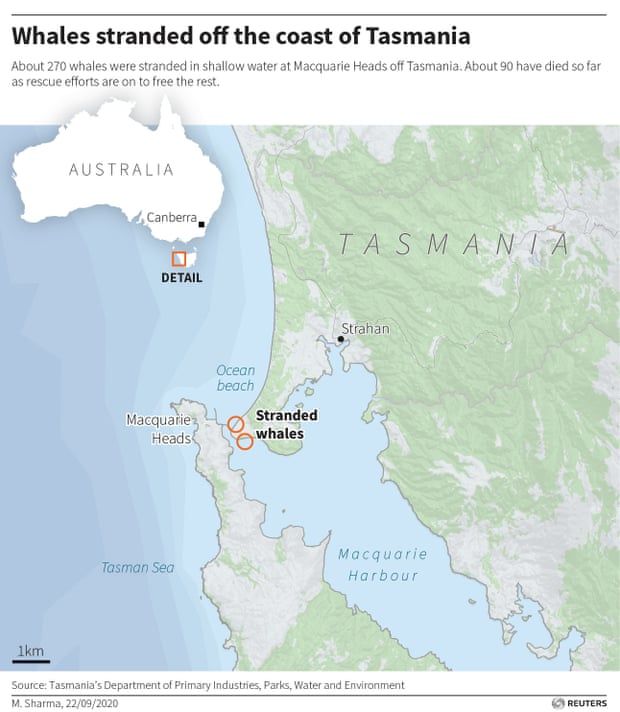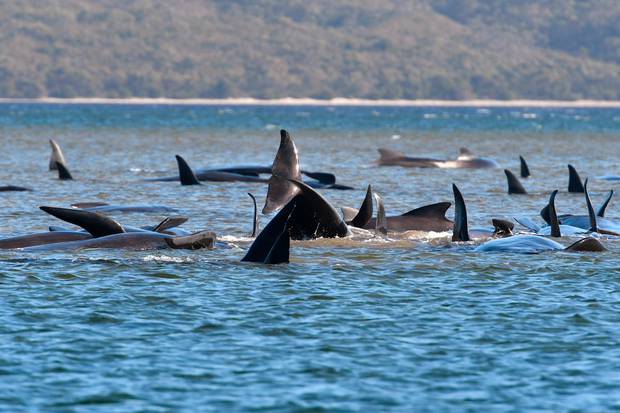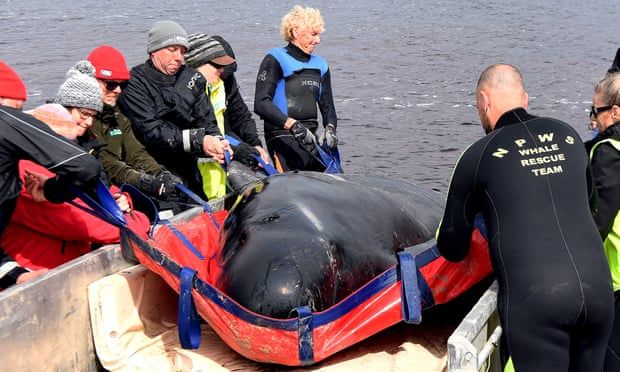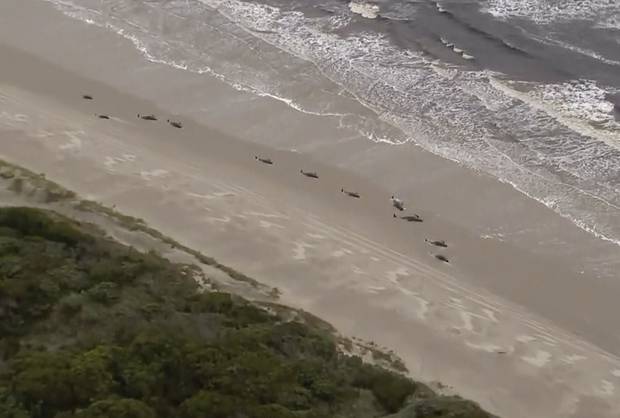Stranding Anomaly as Hundreds of Long-finned Pilot Whales Mass -Strand in Tasmania.
Rescue efforts are underway as 450 of long-finned pilot whales mass strand in Tasmania in one of the world's largest mass stranding events. Gallant volunteers have successfully re-floated around 50 whales, but unfortunately could not save 380 which have been reported to have died. The strandings began on Tuesday and continued into Wednesday and has been described as one of Australia's worst ever mass stranding events.
In one of the largest mass strandings of long-fined pilot whales ( Globicephala melas
) around the globe and indeed in Australias history, rescuers attempt to save hundreds of whales on sandbanks and beaches inside Macquarie Harbour, Tasmania. The last time a stranding event of this enormity was recorded was in 1935, when 294 whales stranded at Stanly.
The coordinated volunteers rescue efforts were originally focused on saving the remaining living whales on Tuesday, near the town of Strahan where the densest area of strandings occurred when 270 pilot whales beached. The rescue group consisted of 60 volunteers led by the Tasmanian Government’s Marine Conservation Program.
" We will try and rescue as many of the remaining live animals as we can
.”- said Nic Deka, the coordinator of the rescue from Tasmania Parks and Wildlife Service.
" The rescuers could hear whales emitting distress calls, like mothers calling out for their calves
"- said Dr Emma Betty, of the Cetacean Ecology Research Group at Massey University in New Zealand
Up to 25 whales were lifted off sandbanks and pulled by boat to open waters on Tuesday, but two had returned to the main stranded pod. A further 25 were rescued on Wednesday.
On Wednesday morning, a further 200 whales were sighted 10 km away from helicopter, in an area called Fraser Flats. Volunteers then entered the second day of the rescue operations on Wednesday, but as most of the whales died it quickly became changed from saving live animals to dealing with hundreds of pilot whale carcasses.
“ From the air, most appeared to be dead .” - said Nic Deka.
" The pod may have come close to the shore to feed, although the exact reason may never be known ." Dr. Kris Carlyon, a wildlife biologist with the Tasmanian Government’s Marine Conservation program said.
Further explanations into the possible reasons for the mass stranding event were given by Dr. Emma Betty, an expert on the life history of long-finned pilot whales and stranding events.
" Most of what we know about long-finned pilot whale comes from stranding events
", she says.
Long-finned pilot whales can be found in pods of 20 to 30 individuals, and sometimes even form "superpods" to allow coordinated feeding en masse or to avoid interbreeding. They feed on squid and fish found below 200m depth, but have capability of diving to 1,000m holding their breath for half an hour. Despite their name, long-finned pilot whale are a toothed cetacean, an oceanic dephinid species.
"T hese mammals push air through their nasal cavity and then through a bulge on their skull – known as a melon – that allows them to focus their clicks
".- says David Hocking, a marine mammal scientist at Monash University.
“I t means they can hunt in the dark and catch fast-moving fish and squid ,” he says.
Long-finned pilot whales have tight knit-social bonds and some individuals stay with their family pod members for their entire lives. They have a matriarchal society where groups are usually led by a dominant female. They use sophisticated commutation through whistles and echoloation which they also depend on to hunt and navigate. Their tight social bonds, cause the species to be particularly vulnerable to mass strandings when they are hunting in shallow gently sloping depths.
Tasmania is currently responding to one of the largest pilot whale mass #strandings on record. Tasmania and NZ are both global hot spots for pilot whale mass strandings. See our recent paper on NZ pilot whale strandings here: https://t.co/mHvS8XX6yZ @AlbanyBiology @MasseyUni pic.twitter.com/wdNRQhNuGa
— Emma Betty (@emmalbetty) September 24, 2020
Prof. Karen Stockin, expert in cetacean strandings from the University of Massey explains more on BBC World News.
Macquarie Harbour is a known hotspot for pilot whale strandings, which frequently occur in shallow, sloping and sandy areas.
“What continues to be the strongest factor is the topography that forms natural whale traps. The whales are unfamiliar with this topography and also probably how the water rushes in and out with tides." - Dr. Emma Betty says.
“They have trouble with the echolocation. Because of the shallow slope they don’t get a clear picture. They’re failing to detect the proximity of the shore until it’s too late, whereas coastal species don’t have that problem.”
Dr. Kris Carlyon, a wildlife biologist with the Tasmanian government’s marine conservation program, has said " the pod may have come close to the shore to feed, although the exact reason may never be known".
" Once the pod was close to shore ", Dr. Betty says, " it’s likely they became disorientated. If a few took a turn into the harbour, the rest may have followed. If some of those whales got stuck on a sandbank they could have sent out a distress call, with more and more of the pod following in ".
Original Sources
:
WWW1: https://www.newstalkzb.co.nz/on-air/early-edition/audio/karen-stockin-nearly-500-pilot-whales-strand...
WWW2: https://www.theguardian.com/environment/2020/sep/25/tragedy-in-tasmania-what-are-pilot-whales-and-wh...
WWW3: https://www.theguardian.com/environment/2020/sep/23/more-than-450-whales-now-stranded-in-tasmania-af...
SHARE THIS ARTICLE




















